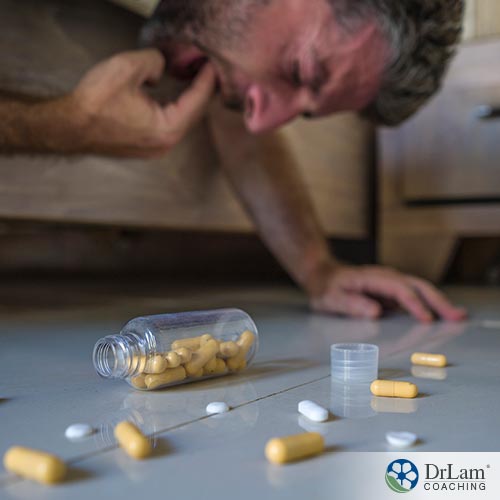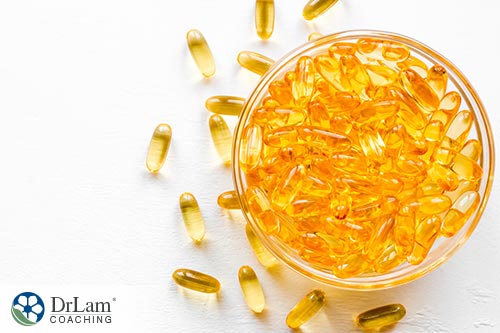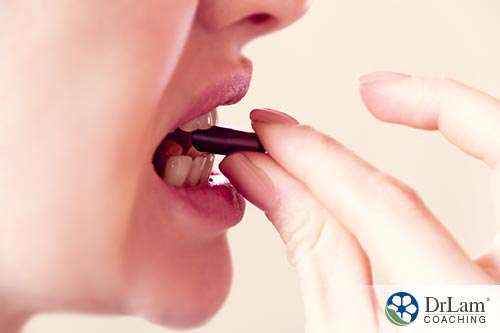Constant stress together with a sedentary, chemical-laden lifestyle and an inadequate diet have a huge effect on our mental health. According to the World Health Organization, about 4.5% of the world’s population suffers from depression, a mental health issue. And of course, the use of antidepressant medications is on the rise, each with its own set of possible side effects. Yet a plethora of natural antidepressants exist that could help manage mental health issues gently and with much fewer side effects.
 In most cases, people suffering from depression receive a combination of various antidepressants. In many cases, the antidepressants cause side effects that are addressed by means of even more medications. Other people may fail to respond to the prescribed antidepressants, with their symptoms continuing and sometimes even worsening. In many cases, the potential for using natural antidepressants is overlooked.
In most cases, people suffering from depression receive a combination of various antidepressants. In many cases, the antidepressants cause side effects that are addressed by means of even more medications. Other people may fail to respond to the prescribed antidepressants, with their symptoms continuing and sometimes even worsening. In many cases, the potential for using natural antidepressants is overlooked.
Some of the side-effects associated with prescription antidepressant medications include digestive disorders, agitation, weight gain, lowered libido, headaches, insomnia, and memory loss. They may also increase some people’s thoughts of suicide.
In addition, many people experience withdrawal symptoms while weaning off antidepressant medications. These withdrawal symptoms include nausea, flu-like symptoms, dizziness, and insomnia, to name but a few. In addition to this, mixing antidepressants with other medications and supplements may cause a cascading effect of health issues that are often not recognized as resulting from the use of prescription antidepressants.
Natural antidepressants refer to herbal and other remedies that occur in nature or which your body could produce itself. In other words, these are not remedies that are man-made in a laboratory.
Much evidence-based literature suggests that natural antidepressants are effective in dealing with depression and other mental health issues like anxiety. We will look at a few of these.
Naturally occurring in cold areas, for centuries Chinese medicine has used this adaptogenic herb to reduce stress-related fatigue and increase stamina. Adaptogenic herbs are non-toxic plants that help your body resist stress from any source, whether physical, biological, or chemical.
Rhodiola may interact with your neuroendocrine, immune, and neurotransmitter receptors to influence depression. It works by increasing the serotonin, dopamine, and norepinephrine activity in your brain, thereby improving depression and insomnia, amongst other related issues.
However, if you suffer from adrenal fatigue or chronic stress, beware of this adaptogen because it could overstimulate your adrenals and cause a crash if your adrenal glands are already fatigued. Always consult with an experienced provider before starting adaptogenic herbs.
The main curcuminoid in turmeric, curcumin affects some of the main systems your body uses to deal with psychological stress: your Hypothalamic-Pituitary-Adrenal (HPA) axis, immune system, inflammatory response, and Neuroaffect circuit. It also has strong antioxidant properties.
Studies suggest curcumin has powerful mood-boosting properties and is one of the most effective natural antidepressants. The supplement LipoNano Curcutrol increases your brain’s serotonin, the happiness hormone, and dopamine, the hormone in charge of your pleasure and reward function.
Besides its effectiveness in addressing major depressive disorder, research suggests it is also effective in dealing with depression combined with obsessive-compulsive disorder.
Most people know saffron as a spice used in Middle Eastern cuisine, giving food a unique coloring while adding a subtle flavor. But few people know that saffron is also one of nature’s natural antidepressants.
The herb, native to some Middle Eastern countries, the Indian sub-continent, and certain areas of the southern Mediterranean, has strong antidepressant properties according to studies. This may result from the herb’s beneficial action on your brain’s serotonin production. Saffron may also decrease your appetite, so it is a good option when depressed and wanting to lose weight.
It is important to make sure that you purchase saffron from a reliable supplier because this pricy herb is more likely to be faked using marigold stamens and or other false ingredients.
 Many people with depression, according to studies, have low levels of omega-3 fatty acids. Studies show that people with depression who regularly consume fatty fish and fish oil show a marked improvement in their condition.
Many people with depression, according to studies, have low levels of omega-3 fatty acids. Studies show that people with depression who regularly consume fatty fish and fish oil show a marked improvement in their condition.
Omega-3 fatty acids, according to research, may also help improve symptoms of depression that relate to bipolar disorder.
Besides taking omega-3 fatty acids in a supplement form like this Liquid OM-3, you could also consider upping your intake of fatty fish like sardines or salmon and eating more flaxseed, walnuts, and eggs.
Literature suggests St. John’s wort is effective in helping mild and moderate depression and compares well to conventional antidepressants.
There is a downside, however. This herbal supplement may have many of the same negative side effects associated with conventional antidepressants and could even worsen dementia and trigger the negative consequences of bipolar disorder.
If you are considering St. John’s wort, do not take it together with other antidepressants, medications, or supplements, whether natural or conventional. It is vital to talk to your healthcare professional in this regard as it can have severe reactions with other medications.
A relaxing tea loved in certain South Pacific cultures, kava, according to literature, is a great natural remedy for anxiety and depression. This is because it increases your brain’s gamma-aminobutyric acid (GABA) levels.
GABA is a neurotransmitter found in your brain and functions as a chemical messenger that blocks or inhibits certain brain signals and decreases some activity in your nervous system. In so doing, GABA plays an essential role in how your body processes stress.
Kava is also one of the best natural antidepressants for menopausal women dealing with depression because it does not disrupt the body’s estrogen levels.
EGCG is a compound found in green tea that has a remarkable ability to reduce your risk of depression. It also increases your stress resiliency and helps reduce anxiety.
The best way to reap the benefits of EGCG is to drinking green tea daily. This is because your body does not adequately utilize the compound in supplement form.
Besides its antianxiety and antidepressant properties, EGCG also helps boost memory and attention span while improving focus and concentration.
 Gut and brain health share a strong connection. Interestingly, an imbalance in your gut microbiome has shown a strong association with depression and several other health issues.
Gut and brain health share a strong connection. Interestingly, an imbalance in your gut microbiome has shown a strong association with depression and several other health issues.
Many studies show that the use of probiotics like Pro-B and Adrebiotics can not only help address gut health issues and the symptoms of depression, but they also help stabilize insulin levels and increase the antioxidants in your body as well.
SAMe, a compound that naturally occurs in the body, plays a role in cellular metabolism and methylation. Research shows that it may be an effective substitute to consider for those who do not respond well to conventional antidepressants.
A supplement like SAMe that works well in addressing depression, it has also proved quite effective for those with depression relating to Parkinson’s disease.
An amino acid derived from protein sources like eggs and meat, tryptophan is a precursor to serotonin and melatonin. Literature indicates that this amino acid is an effective antidepressant and may also benefit those with insomnia, anxiety, and seasonal affective disorder, amongst others.
Interestingly, research shows your body responds better to a tryptophan supplement than from tryptophan in food, and the presence of protein blocks tryptophan synthesis into serotonin.
Please do be careful about considering a tryptophan supplement when already using a selective serotonin reuptake inhibitor (SSRI) antidepressant. Doing so would increase your risk of developing serotonin syndrome. This serious condition, associated with high serotonin levels, includes such symptoms as shivering, diarrhea, fever, muscle rigidity, and seizures and, if left untreated, could result in death.
This amino acid, created in your body, helps turn fat into energy. According to literature, it also has anti-aging and brain-boosting properties. ALC is also needed for the creation of acetylcholine, a neurotransmitter in the brain that helps with memory and learning. Interestingly, people with Alzheimer’s tend to have low acetylcholine levels.
People usually reap the antidepressant benefits of this supplement within a week after they start using it.
Besides its antidepressant benefit, ALC also benefits your heart function, muscle movement, and various other body processes.
Prolonged exposure to stress could result in Adrenal Fatigue Syndrom (AFS). This occurs when chronic stress causes your HPA axis to pump out too much cortisol, eventually fatiguing your NeurEndoMetabolic (NEM) Stress Response, your body's main strategy for dealing with stress. The Neuroaffect circuit, which is part of the NEM, is made up of the brain, autonomic nervous system, and microbiome. Therefore, all three of these components are involved in dealing with stress and depression.
The beginning stages of adrenal fatigue may see a marked increase in cortisol levels, the stress hormone. However, the latter stages could see your adrenals unable to comply with the demand. Ultimately, they could suffer burnout and increasingly produce less. This could cause various symptoms, amongst them, depression.
If you have AFS or other complicating conditions, it is important to find the root cause of the depression and try to resolve that, rather than resorting to antidepressants. Natural antidepressants can be a good alternative to boost your neurotransmitters while helping to avoid dangerous withdrawal symptoms and side effects. In many instances, natural antidepressants put less of a load on your adrenal glands and even provide adrenal support. This is not necessarily the case with conventional antidepressants.
People with health issues often take medications and supplements. Very often, natural antidepressants have an interaction with other supplements as well as certain medications. So, taking natural antidepressants is something you should best do after consultation with a qualified healthcare professional. They may be able to advise you about possible contraindications, as well as whether the supplement would further aggravate an existing condition.
While natural antidepressants have shown great antidepressant properties, you should still be cautious when using them.
If suffering from depression, here are a few things you can do to help alleviate the situation.

If you would like to know more about or need assistance with natural antidepressants and their use, the team at Dr. Lam Coaching can help. We offer a free** no-obligation phone consultation at +1-626-571-1234 where we will privately discuss your symptoms and various options. You can also send us a question through our Ask The Doctor system by clicking here.
This depends on the herb, other medications, and your stage of AFS. Many natural antidepressants, when used in conjunction with conventional medicine, may have adverse reactions. Similarly, they could affect other existing health conditions negatively. So, the best advice is to consult a healthcare professional before using them.
